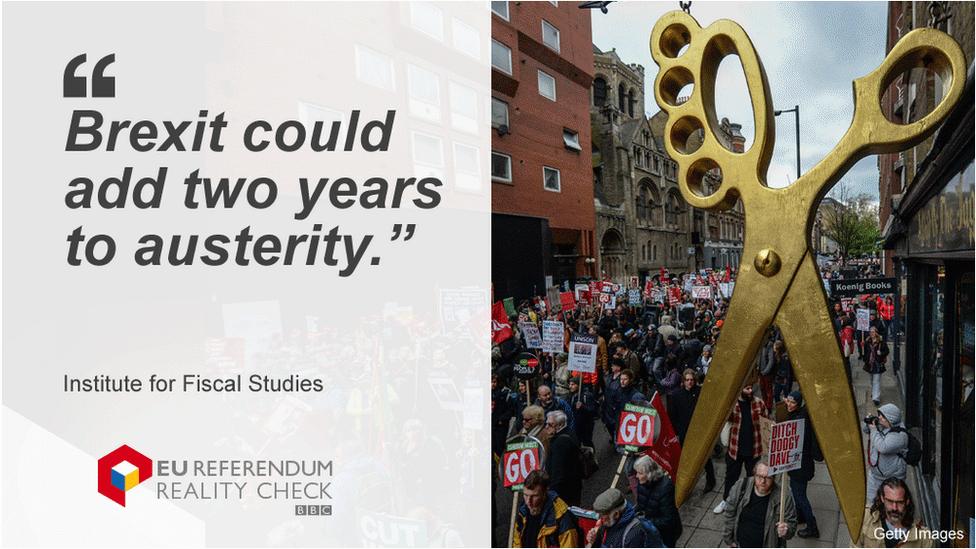Reality Check: Would Brexit add two years to austerity?
- Published

The claim: The economic impact of leaving the European Union would lead to a loss of £20bn to £40bn from the public finances, extending austerity by a further two years.
Reality Check verdict: The relationship between Brexit and the public finances may not be exactly as described. But if - like the IFS - you accept predictions that leaving the EU would cut economic growth, it is hard to imagine that would not hit the public finances. Such a scenario would require spending to be cut further, taxes to be increased or the period of austerity to be extended.
The Institute for Fiscal Studies (IFS) has released a report suggesting that the UK leaving the European Union could lead to austerity being extended by two years.
How did it get to that figure?
First of all, the IFS did not do its own economic modelling of the impact of a Brexit on the economy. Instead it used the National Institute of Economic and Social Research's model, external, which predicted that leaving the EU would lead to GDP in 2030 being between 1.5% and 7.8% lower than it would have been the UK stayed in the EU, depending on what sort of relationship ended up being negotiated with the single market.
The IFS actually says that the extra period of austerity would be between one and two years.
Its research has suggested that a 1% decline in in GDP increases borrowing for the government by 0.7% of GDP.
So, at the optimistic end of the NIESR predictions, in which the UK becomes part of the European Economic Area post-Brexit, the IFS reckons that in 2019-20, when the Chancellor wants to have a £10.4bn economic surplus, we would actually have a £17bn deficit. It says that the UK would need an extra 1.1 years of austerity at the current pace to turn around that deficit.
At the other end of the scale, NIESR's pessimistic forecast - in which the UK ends up trading under World Trade Organisation rules without special relationships with any other nation - the forecast is for a £28bn deficit, which would take an extra two years to return to the £10.4bn surplus.
Following past trends
So is all this convincing? First, it suffers from the same uncertainties involved in all economic forecasting, which we have discussed in the past.
Second, the relationship of a 1% decline in GDP knocking 0.7% of GDP off the government's finances is an average based on past experience, caused by reduced tax revenue and increased demand for benefits; it will not necessarily happen like that in future.
The IFS sets out some of the reasons why the relationship may not be followed precisely. They include whether the parts of national income hit by Brexit are those that affect the government finances which are relatively heavily taxed, such as wages or consumer spending, as opposed to ones like exports and investment which are relatively lightly taxed.
There are also factors other than the change in GDP that could affect the public finances post-Brexit, such as lenders demanding higher interest rates to lend money to the UK government, or increased inflation.
So while the relationship may not be precisely the one identified by the IFS, it is hard to imagine that lower GDP growth would not affect the public finances, requiring spending to be cut further, taxes to be increased or the period of austerity to be extended.



- Published22 February 2016
